We’ve heard it repeated numerous times, by the Prime Minister and members of the government.
We’ve heard it in the media and on the news too as advice for controlling the spread of Coronavirus Covid-19: wash your hands for as long as it takes to sing Happy Birthday twice: about 20-30 seconds. Mind you, I find that if you sing it at the same pace as Stevie Wonder, it takes a lot longer than that.
This is no laughing matter
Yes, sorry. Indeed, washing your hands for the right amount of time is important. Every theory that tries to model the spread of a human-to-human virus shows a significant reduction in the speed and breadth of an outbreak when people wash their hands more regularly.
All in the technique
However, added to the time you take, there’s a technique to washing your hands thoroughly that we need to follow to make the practice as effective as possible in slowing the spread. This technique has been produced and publicised by the NHS, who use it as the basis for good hygiene in hospitals and medical practices:
1. Wet your hands with water
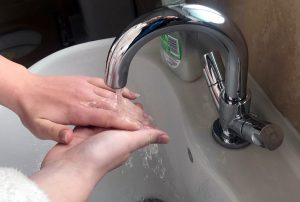
Warm water is best as it’s better at breaking down oils, but cold water is fine – it’s the soap and action of rubbing your hands that are most effective.
2. Apply enough soap to cover your hands
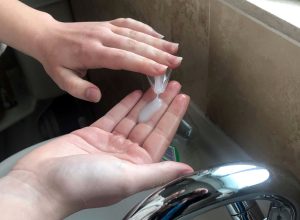
This can be a bar of hard soap or liquid from a pump. It doesn’t need to be antibacterial – there is very little evidence that soap advertised as antibacterial is any more effective in cleaning microbes from your hands than normal soap.
3. Rub your hands together
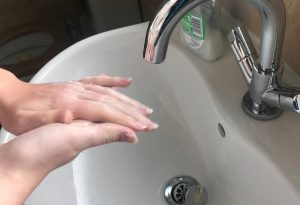
Make sure the soap covers your hands and wrists
4. Use 1 hand to rub the back of the other hand and clean in between the fingers. Do the same with the other hand.
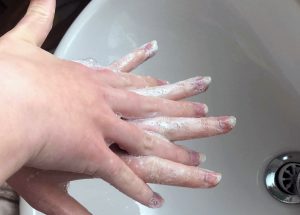
Many of us forget to wash the backs of our hands, but for a thorough cleaning job we need to make a point of doing so.
5. Rub your hands together and clean in between your fingers.
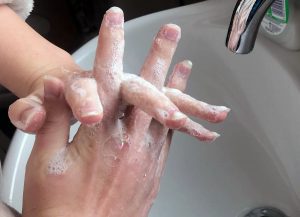
This helps get soap in between your fingers and makes sure you rub all the nooks and crannies of your digits.
6. Rub the back of your fingers against your palms.
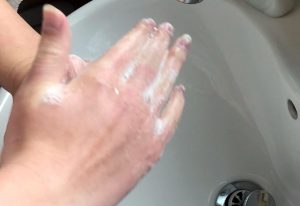
Again, the backs of your hands and fingers can potentially harbour the virus, and you’d be surprised how often you touch your face with all parts of your hands each day
7. Rub your thumb using your other hand. Do the same with the other thumb.
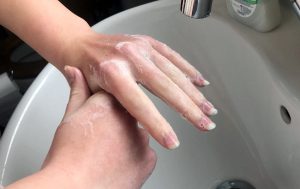
Don’t forget the thumbs! They are only two of the (usual) ten digits, but they do a disproportionately high amount of work and you use them every time you pick anything up.
8. Rub the tips of your fingers on the palm of your other hand. Do the same with the other hand.
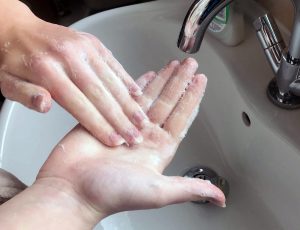
Things you interact with find most contact with you at your fingertips, and these are also the most likely parts of your hand with which you’re going to touch your eyes, nose and mouth, so it’s important they’re kept free of the virus!
9. Rinse your hands with water.
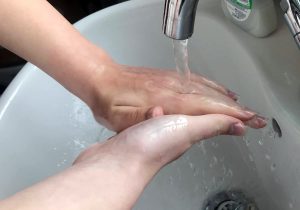
A thorough rinse is essential to wash away the soap and to take away all the dirt, grease and microbes with it. Making sure the soap is thoroughly rinsed away will also help prevent your hands from becoming sore from soap drying on your skin.
10. Dry your hands completely with a disposable towel, or with a towel that you change frequently for a freshly-laundered one.
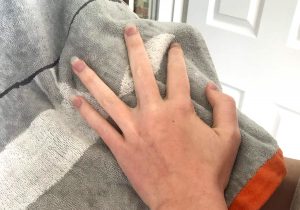
The more people you have in your household, the more frequently you should launder the towels.
What about the tap and the soap?
The soap is fine – you don’t need to touch it or the soap dispenser again now you’ve washed your hands. But you do need to turn off the tap. The NHS guidelines say that you should use your elbow or the disposable towel to turn off the tap. At home, this might not be practical. What you can do is make sure you clean the taps in your home frequently with a disinfectant spray, and keep tissues close to the basin so you can use one to turn off the tap. Then bin or flush the tissue.
Brave new world
It all seems a little like overkill, doesn’t it? But getting the better of the any virus outbreak will only happen if we do everything we can to stop it spreading by following good hygiene practices, so if we come into contact with an infected person or something they have recently touched, we reduce the likelihood that we will contract that infection.
Please stay safe, and remember: when people say Social Distancing, they really mean Physical Distancing. Do be social as much as you can: remember to stay in touch with family and friends to make sure we’re all ok!
More information about Coronavirus Covid-19
For more information, please do carefully read the advice from these organisations (and avoid the social media rumour-mill!):
UK Govt: https://www.gov.uk/coronavirus
NHS: https://www.nhs.uk/conditions/coronavirus-covid-19/
WHO: https://www.who.int/emergencies/diseases/novel-coronavirus-2019













